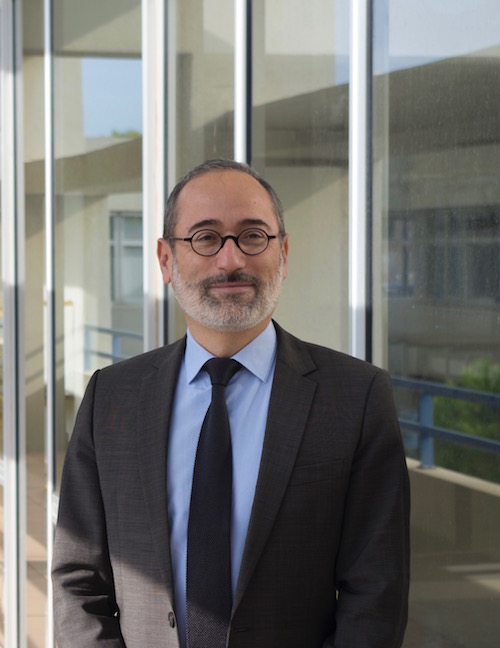A new President for the Fédération Gay-Lussac

 « The Fédération Gay-Lussac (FGL) is necessary more than ever! It is a unique organization in the higher education system because it is the largest network representing 10% of the engineering schools in France! »
« The Fédération Gay-Lussac (FGL) is necessary more than ever! It is a unique organization in the higher education system because it is the largest network representing 10% of the engineering schools in France! »
Frédéric Fotiadu, Director of École Centrale de Marseille, was elected President of the FGL during the Annual General Meeting on March 17, 2017. He succeeded Pierre Le Cloirec, Director of the ENSCR (Rennes Chemical Engineering School), who had been President since 2015, thus at the end of his term of office.
Could you tell us a little about your career?
In 1987, I obtained my diploma in chemistry and chemical engineering from the École Supérieure de Chimie de Marseille, which later became the ENSSPICAM (Graduate School of Synthesis, Processes and Chemical Engineering in Aix-Marseille), one of the founding schools of École Centrale de Marseille. After completing a doctorate in organic chemistry, I continued in research at the Autonomous University of Barcelona until 1994 before returning to Marseille as Lecturer in Professor Gérard Buono’s team.
I experienced first-hand the changes in the Ecole de Chimie de Marseille which underwent two mergers in order to become École Centrale de Marseille. This was a great professional adventure because at its creation, I took part in the setting up of new programmes and also piloted the development and improvement of the chemistry courses. In 2005, I was appointed Professor in the Institut des Sciences Moléculaires de Marseille, before becoming Director of the École Doctorale des Sciences Chimiques (Doctorate school) and also of International Relations in École Centrale de Marseille. I have been Director of the latter since November 2009.
Why is École Centrale de Marseille part of the FGL when it is not specialized in chemistry?
École Centrale de Marseille has always been part of the FGL because it inherited a School of Chemistry and we wished to keep a strong link with this sector. In this school, there is all the expertise of the establishments with which we merged. We combined all the skills and competence from there! We are a medium-sized school with about 1000 students and 170 staff, but one which is rapidly growing.
Today, we offer integrated broad-based engineering courses where all the minimum skills and know-how are taught in the domains of chemistry and process engineering. Some students become engineers who are particularly competent in chemistry, process engineering or biochemistry. We also have master’s and doctorate studies in these domains. In the 5 Ecoles Centrales, we are the only one to offer these domains.
However, in the last few years, the evolution in higher education makes us less unique! In fact, at the moment, there is a desire to merge and so many schools in the FGL no longer offer a single specialty in chemistry. This is already the case for CPE Lyon and ESPCI Paris. It is now also true for the INSA network of schools, SIGMA Clermont, and ENSIL-ENSCI (Limoges).
Within the context where the number of networks is increasing, what will be the specificities of the FGL?
The FGL is necessary more than ever! It is a unique organization in the higher education system because it is the largest network representing 10% of the engineering schools in France with a great diversity in its statutes (Public and private schools, EPA (public establishment of an administrative nature), etc.) and networks (INSA, INP, IMT, ParisTech, and Centrale, etc.)
The FGL enables exchange and discussion in terms of chemistry careers, research and specificities in teaching and recruitment. We are not a corporate network, but in fact a very diverse and open one, with a strong single identity which is the sum of our differences. The FGL forges its identity in order to reach out to the public we are interested in i.e. French and foreign students who want to work in chemistry, and companies.
What focus do you want for future actions of the FGL in the next two years?
The FGL is growing. Different Ecoles have joined us because we are very dynamic, well-known and have a good reputation. One of our major aims is international development by increasing the influence and recognition of the FGL seal of excellence, as well as the worldwide deployment of the French model for educating engineers. The project for an Ecole de Chimie in Beijing is totally in line with this ideal. It is difficult today to find a place in the global higher education market and select good candidates. The FGL consists of small schools with a total of 1700 students who graduate from our 20 Ecoles every year. However, the FGL is suitably large to be seen in the world. Our educational model is a real force in this very competitive market, and having an international outlook is a necessity in order to increase the diversity of our public and resources.
The second principal focus for the FGL is the diversification of the public we want to attract. The FGL has already revealed its capacity to diversify its recruitment and the integrated preparatory classes (CPI) are a perfect illustration. Today, the FGL is thinking about developing new ways to reach other audiences but also to offer pre-diploma or complementary diploma courses, with an FGL seal of excellence.
Finally, for company relations, the FGL network must as a whole create contacts with firms. We cover all the chemical engineering courses given in France and should therefore be their preferred and key interlocutor.
During the Annual General Meeting, the FGL also renewed its Bureau.
